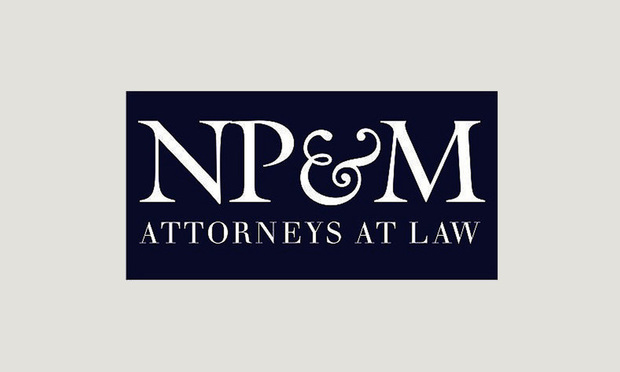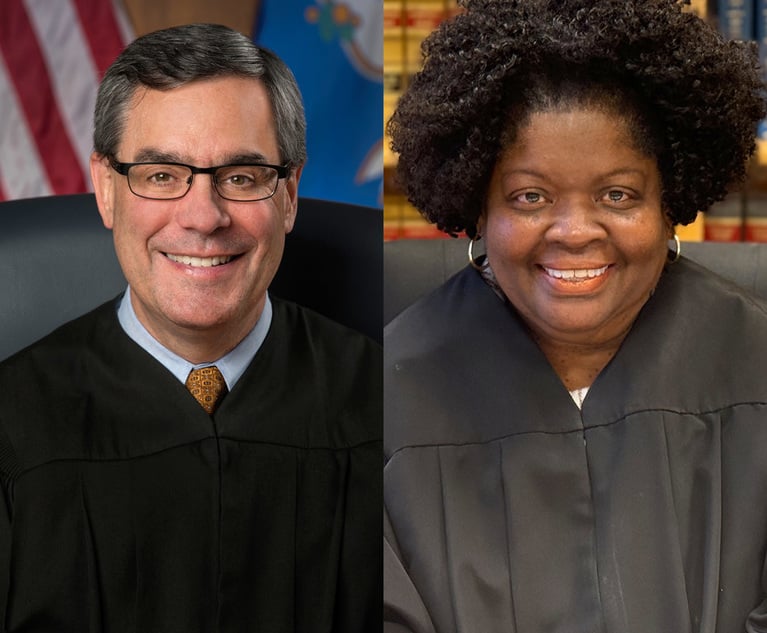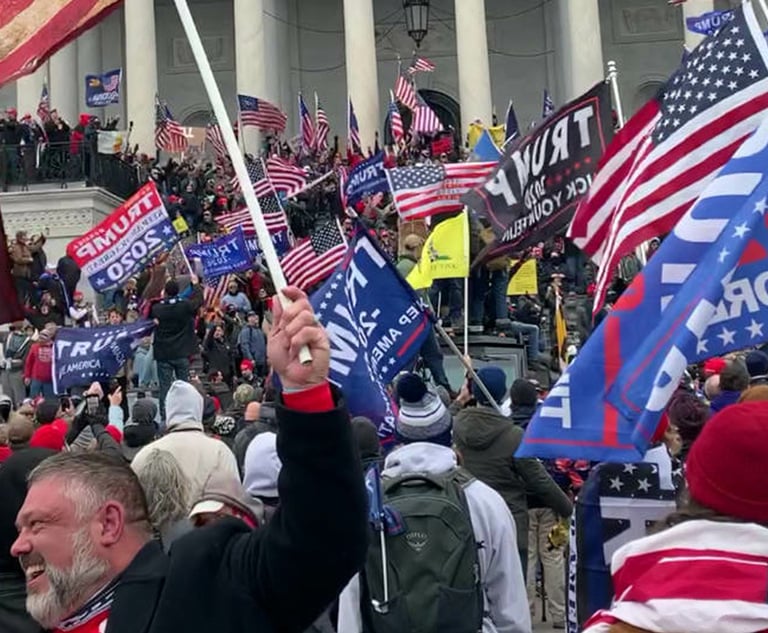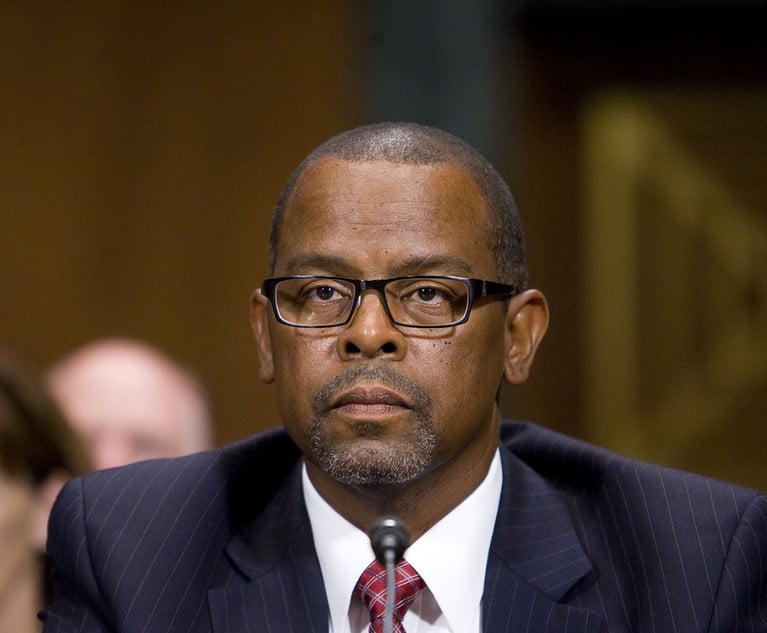Judge Brings Gavel Down on New Haven Attorney, Referred to Statewide Grievance Committee
Superior Court Judge Susan Quinn Cobb referred Gretchen Randall, a principal at New Haven's Neubert, Pepe & Monteith, to the Connecticut Statewide Grievance Committee.
September 24, 2019 at 12:43 PM
4 minute read
 New Haven's Neubert, Pepe & Monteith. Photo: Google
New Haven's Neubert, Pepe & Monteith. Photo: Google
In a stinging rebuke, a Superior Court judge announced Sept. 18 that she would refer Neubert, Pepe & Monteith principal Gretchen Randall to the Statewide Grievance Committee for providing inaccurate interrogatories to the plaintiff's counsel in a premises liability slip-and-fall case.
The judge also ordered a mistrial, and said a new trial with a new judge would be set for December to unravel why Randall hadn't mentioned a video recording of the incident at the center of the suit.
"Because the court believes that it has an obligation to do so, it is the court's intention to refer counsel to the grievance committee, something I have never done in my nine and a half years sitting on the bench," Hartford Superior Court Judge Susan Quinn Cobb said. "Doing this gives me no pleasure, but not doing anything is not an option as it sends the wrong message to counsel, to her firm, and to other counsel practicing in this state, that filling out interrogatory forms in this manner is not appropriate."
Randall, who specializes in medical malpractice and hospital liability defense and professional malpractice and insurance defense, referred all comment to Mike Neubert, the firm's managing partner. Neubert told the Connecticut Law Tribune Tuesday, "Because this matter is still in litigation, it's inappropriate to comment. But we are confident attorney Randall did not breach any of her professional obligations."
Plaintiff counsel Ed Gasser of Avon-based Gasser Law Firm declined to comment for this report.
Gasser had requested a motion for sanctions against Randall. He represents MaryAnn Prince, who is suing Eastern Connecticut Health Network Inc. and Prospect Manchester Hospital Inc., alleging she fell and suffered injuries from a broken section of a cement walkway.
At the crux of Cobb's decision are interrogatories plaintiff's counsel sent to Randall, who represented defendants, including ECHN.
According to the judge's timeline of events, the defendant's risk manager, Ann Donahue, certified under oath that the answers to the interrogatories were true and accurate. Randall signed the certification and informed the court in chambers that she had advised the defendants and Donahue as to the answers. But, the judge wrote, the answers were not accurate.
Two questions, specifically, the judge said, were not answered honestly. The first question asks whether any written report of the incident noted in the complaint was prepared by "you or your employees in the regular course of business." Donahue answered no when she should have answered yes, the judge said.
The second question reads: "Have you made any statements, as defined in the Connecticut Practice Book, section 13-1, to any person regarding any of the incidents in the complaint." Again Donahue answered no when she should have said yes, Cobb wrote.
At the center of the case is Reggie Davis, a hospital security officer, who knew the plaintiff's daughter. Davis met with the plaintiff and her daughter the day after the incident. He examined the area where Prince said she fell, and took information from both women concerning the incident.
Davis, the judge wrote, also wrote an email to his supervisor setting forth the details of the meeting with the two women and that the plaintiff had reported falling the day before. The judge said the email included all of the information that Davis would have included in a hospital incident report.
There was a video of the incident. That video no longer exists due to a changeover in the hospital's camera systems, according to the litigants, despite Davis taking steps to save the video so it would not be taped over.
The judge wrote that Randall, maintaining that Davis' email to the supervisor was not a statement, "apparently made the deliberate decision not to disclose the email. The court also believes that the defendant had a duty to disclose the existence of the video and that it had been destroyed inadvertently or not." Cobb also wrote that "the court has a duty to send a message that this sort of discovery practice is inappropriate."
The 10-page transcript shows that Cobb said with regard to discovery that Randall might have violated the following Rules of Professional Conduct: 3.1, involving meritorious claims and contentions; 3.3, involving candor toward the tribunal; and 3.4, regarding fairness to opposing counsel and the commentaries to those rules.
This content has been archived. It is available through our partners, LexisNexis® and Bloomberg Law.
To view this content, please continue to their sites.
Not a Lexis Subscriber?
Subscribe Now
Not a Bloomberg Law Subscriber?
Subscribe Now
NOT FOR REPRINT
© 2025 ALM Global, LLC, All Rights Reserved. Request academic re-use from www.copyright.com. All other uses, submit a request to [email protected]. For more information visit Asset & Logo Licensing.
You Might Like
View All

‘Undermines the Rule of Law’: Retired US Judges Condemn Trump’s Jan. 6 Pardons

Art of the Settlement: Trump Attorney Reveals Strategy in ABC Lawsuit

‘Really Deflating’: Judges React to Biden Threat to Veto New Judgeships Bill
Trending Stories
- 1Uber Files RICO Suit Against Plaintiff-Side Firms Alleging Fraudulent Injury Claims
- 2The Law Firm Disrupted: Scrutinizing the Elephant More Than the Mouse
- 3Inherent Diminished Value Damages Unavailable to 3rd-Party Claimants, Court Says
- 4Pa. Defense Firm Sued by Client Over Ex-Eagles Player's $43.5M Med Mal Win
- 5Losses Mount at Morris Manning, but Departing Ex-Chair Stays Bullish About His Old Firm's Future
Who Got The Work
J. Brugh Lower of Gibbons has entered an appearance for industrial equipment supplier Devco Corporation in a pending trademark infringement lawsuit. The suit, accusing the defendant of selling knock-off Graco products, was filed Dec. 18 in New Jersey District Court by Rivkin Radler on behalf of Graco Inc. and Graco Minnesota. The case, assigned to U.S. District Judge Zahid N. Quraishi, is 3:24-cv-11294, Graco Inc. et al v. Devco Corporation.
Who Got The Work
Rebecca Maller-Stein and Kent A. Yalowitz of Arnold & Porter Kaye Scholer have entered their appearances for Hanaco Venture Capital and its executives, Lior Prosor and David Frankel, in a pending securities lawsuit. The action, filed on Dec. 24 in New York Southern District Court by Zell, Aron & Co. on behalf of Goldeneye Advisors, accuses the defendants of negligently and fraudulently managing the plaintiff's $1 million investment. The case, assigned to U.S. District Judge Vernon S. Broderick, is 1:24-cv-09918, Goldeneye Advisors, LLC v. Hanaco Venture Capital, Ltd. et al.
Who Got The Work
Attorneys from A&O Shearman has stepped in as defense counsel for Toronto-Dominion Bank and other defendants in a pending securities class action. The suit, filed Dec. 11 in New York Southern District Court by Bleichmar Fonti & Auld, accuses the defendants of concealing the bank's 'pervasive' deficiencies in regards to its compliance with the Bank Secrecy Act and the quality of its anti-money laundering controls. The case, assigned to U.S. District Judge Arun Subramanian, is 1:24-cv-09445, Gonzalez v. The Toronto-Dominion Bank et al.
Who Got The Work
Crown Castle International, a Pennsylvania company providing shared communications infrastructure, has turned to Luke D. Wolf of Gordon Rees Scully Mansukhani to fend off a pending breach-of-contract lawsuit. The court action, filed Nov. 25 in Michigan Eastern District Court by Hooper Hathaway PC on behalf of The Town Residences LLC, accuses Crown Castle of failing to transfer approximately $30,000 in utility payments from T-Mobile in breach of a roof-top lease and assignment agreement. The case, assigned to U.S. District Judge Susan K. Declercq, is 2:24-cv-13131, The Town Residences LLC v. T-Mobile US, Inc. et al.
Who Got The Work
Wilfred P. Coronato and Daniel M. Schwartz of McCarter & English have stepped in as defense counsel to Electrolux Home Products Inc. in a pending product liability lawsuit. The court action, filed Nov. 26 in New York Eastern District Court by Poulos Lopiccolo PC and Nagel Rice LLP on behalf of David Stern, alleges that the defendant's refrigerators’ drawers and shelving repeatedly break and fall apart within months after purchase. The case, assigned to U.S. District Judge Joan M. Azrack, is 2:24-cv-08204, Stern v. Electrolux Home Products, Inc.
Featured Firms
Law Offices of Gary Martin Hays & Associates, P.C.
(470) 294-1674
Law Offices of Mark E. Salomone
(857) 444-6468
Smith & Hassler
(713) 739-1250










